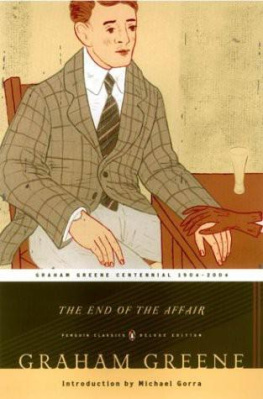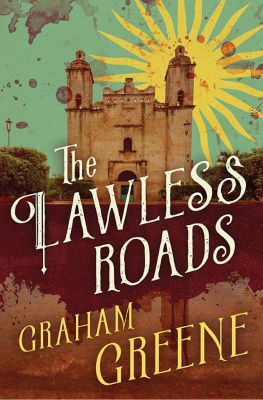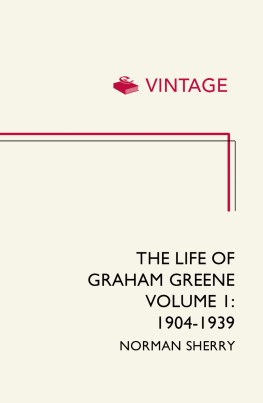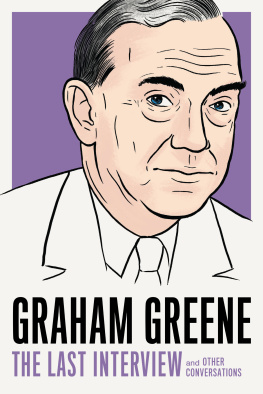
The Human Factor
'I only know that he who forms a tie is lost. The germ of corruption
has entered into his soul.'
Joseph Conrad
PART ONE
Chapter I
I
Castle, ever since he had joined the firm as a young recruit more than thirty years ago, had taken his lunch in a public house behind St James's Street, not far from the office. If he had been asked why he lunched there, he would have referred to the excellent quality of the sausages; he might have preferred a different bitter from Watney's, but the quality of the sausages outweighed that. He was always prepared to account for his actions, even the most innocent, and he was always strictly on time.
So by the stroke of one he was ready to leave. Arthur Davis, his assistant, with whom he shared a room, departed for lunch punctually at twelve and returned, but often only in theory, one hour later. It was understood that, in case of an urgent telegram, Davis or himself must always be there to receive the decoding, but they both knew well that in the particular sub-division of their department nothing was ever really urgent. The difference in time between England and the various parts of Eastern and Southern Africa, with which the two of them were concerned, was usually large enougheven when in the case of Johannesburg it was little more than an hour for no one outside the department to worry about the delay in the delivery of a message: the fate of the world, Davis used to declare, would never be decided on their continent, however many embassies China or Russia might open from Addis Ababa to Conakry or however many Cubans landed. Castle wrote a memorandum for Davis: If Zaire replies to No. 172 send copies to Treasury and FO.' He looked at his watch. Davis was ten minutes late.
Castle began to pack his briefcasehe put in a note of what he had to buy for his wife at the cheese shop in Jermyn Street and of a present for his son to whom he had been disagreeable that morning (two packets of Maltesers), and a book, Clarissa Harlowe, in which he had never read further than Chapter LXXIX of the first volume. Directly he heard a lift door close and Davis's step in the passage he left his room. His lunchtime with the sausages had been cut by eleven minutes. Unlike Davis he always punctually returned. It was one of the virtues of age.
Arthur Davis in the staid office was conspicuous by his eccentricities. He could be seen now, approaching from the other end of the long white corridor, dressed as if he had just come from a rather horsy country week-end, or perhaps from the public enclosure of a racecourse. He wore a tweed sports jacket of a greenish over-all colour, and he displayed a scarlet spotted handkerchief in the breast pocket: he might have been attached in some way to a tote. But he was like an actor who has been miscast: when he tried to live up to the costume, he usually fumbled the part. If he looked in London as though he had arrived from the country, in the country when he visited Castle he was unmistakably a tourist from the city.
'Sharp on time as usual,' Davis said with his habitual guilty grin.
'My watch is always a little fast,' Castle said, apologising for the criticism which he had not expressed. 'An anxiety complex, I suppose.'
'Smuggling out top secrets as usual?' Davis asked, making a playful pretence at seizing Castle's briefcase. His breath had a sweet smell: he was addicted to port.
'Oh, I've left all those behind for you to sell. You'll get a better price from your shady contacts.'
'Kind of you, I'm sure.'
'And then you're a bachelor. You need more money than a married man. I halve the cost of living. '
'Ah, but those awful leftovers,' Davis said, 'the joint remade into shepherd's pie, the dubious meatball. Is it worth it? A married man can't even afford a good port.' He went into the room they shared and rang for Cynthia. Davis had been trying to make Cynthia for two years now, but the daughter of a major-general was after bigger game. All the same Davis continued to hope; it was always safer, he explained, to have an affair inside the departmentit couldn't he regarded as a security risk, but Castle knew how deeply attached to Cynthia Davis really was. He had the keen desire for monogamy and the defensive humour of a lonely man. Once Castle had visited him in a flat, which he shared with two men from the Department of the Environment, over an antique shop not far from Claridge'svery central and W.I.
'You ought to come in a bit nearer,' Davis had advised Castle in the overcrowded sitting-room where magazines of different tastesthe New Statesman, Penthouse and Naturelittered the sofa, and where the used glasses from someone else's party had been pushed into corners for the daily woman to find.
'You know very well what they pay us,' Castle said, 'and I'm married.'
'A grave error of judgement.'
'Not for me,' Castle said, 'I like my wife.'
'And of course there's the little bastard,' Davis went on. I couldn't afford children and port as well.'
'I happen to like the little bastard too.'
Castle was on the point of descending the four stone steps into Piccadilly when the porter said to him, 'Brigadier Tomlinson wants to see you, sir.'
'Brigadier Tomlinson?'
'Yes. In room A.3.'
Castle had only met Brigadier Tomlinson once, many years before, more years than he cared to count, on the day that he was appointedthe day he put his name to the Official Secrets Act, when the brigadier was a very junior officer, if he had been an officer at all. All he could remember of him was a small black moustache hovering like an unidentified flying object over a field of blotting paper, which was entirely white and blank, perhaps for security reasons. The stain of his signature after he had signed the Act became the only flaw on its surface, and that leaf was almost certainly torn up and sent to the incinerator. The Dreyfus case had exposed the perils of a wastepaper basket nearly a century ago.
'Down the corridor on the left, sir,' the porter reminded him when he was about to take the wrong route.
'Come in, come in, Castle,' Brigadier Tomlinson called. His moustache was now as white as the blotting paper, and with the years he had grown a small pot-belly under a double-breasted waistcoatonly his dubious rank remained constant. Nobody knew to what regiment he had formerly belonged, if such a regiment indeed existed, for all military titles in this building were a little suspect. Ranks might just be part of the universal cover. He said, 'I don't think you know Colonel Daintry.'
'No. I don't think... How do you do?'
Daintry, in spite of his neat dark suit and his hatchet face, gave a more genuine out-of-doors impression than Davis ever did. If Davis at his first appearance looked as though he would be at home in a bookmakers' compound, Daintry was unmistakably at home in the expensive enclosure or on a grouse moor. Castle enjoyed making lightning sketches of his colleagues: there were times when he even put them on to paper.
'I think I knew a cousin of yours at Corpus,' Daintry said. He spoke agreeably, but he looked a little impatient; he probably had to catch a train north at King's Cross.
'Colonel Daintry,' Brigadier Tomlinson explained, 'is our new broom,' and Castle noticed the way Daintry winced at the description. 'He has taken over security from Meredith. But I'm not sure you ever met Meredith.'
'I suppose you mean my cousin Roger,' Castle said to Daintry. I haven't seen him for years. He got a first in Greats. I believe he's in the Treasury now.'
'I've been describing the set-up here to Colonel Daintry,' Brigadier Tomlinson prattled on, keeping strictly to his own wavelength.
Next page






